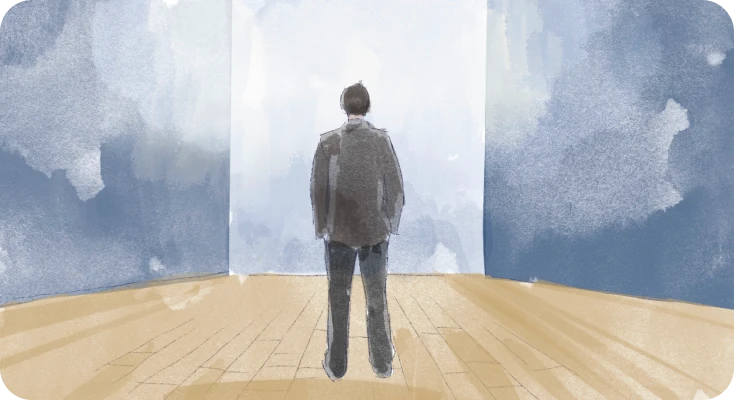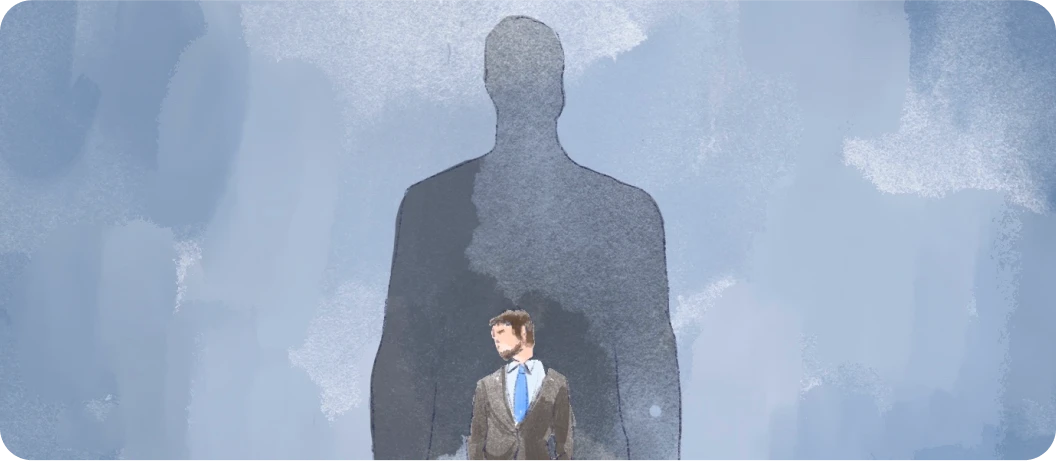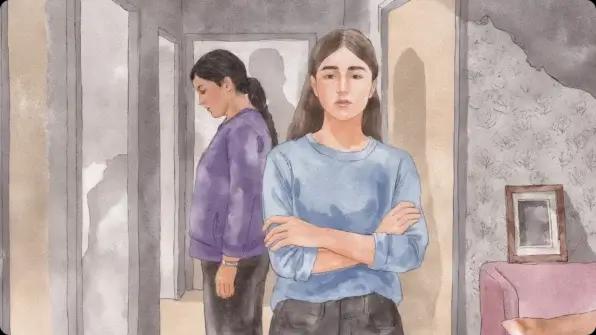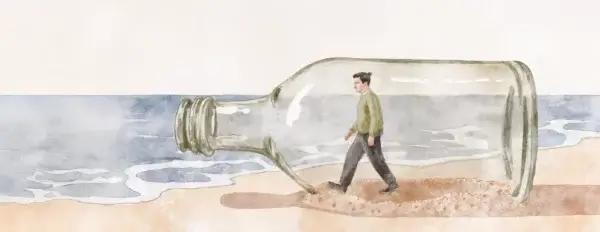One moment, he’s loving; the next, he’s distant or angry, calling you hurtful names, like “stupid” or “useless”? You’re never good enough, no matter how hard you try. These can be signs of abusive father’s behavior.
How does an abusive father affect a child? Unfortunately, a father wound can leave deep emotional scars that affect a child’s development and well-being throughout life.
The trauma caused by physical, emotional, or psychological abuse can shape a child’s sense of self and relationships. They may feel like, “I hate my dad,” but still try again and again to earn their love and prove their worth.
Could childhood trauma be impacting your present? Find out now.
8 Signs of an Abusive Father
If you wonder, “Is my dad abusive?” recognizing the signs of an abusive father may help you understand the impact of the trauma. Below are some common traits that may indicate it:
1. They use force for discipline
An abusive father may use physical punishment, such as hitting, slapping, or pushing, that often crosses the line from discipline to abuse.
For instance, some parents believe spanking is an effective way to discipline a child. However, it can quickly escalate into physical abuse. Even when done “in the heat of the moment,” it can have lasting effects.
Typically, spanking and other forms of physical punishment humiliate the child, making them feel powerless and unsafe in their own home. Moreover, it can teach them that violence is acceptable for handling conflict.
Rychel Johnson, a licensed clinical professional counselor, explained how spanking as a form of discipline can impact the child.
Research shows that physical punishment, including spanking, is associated with increased aggression, anxiety, and depression in children. It can harm the parent-child relationship by fostering fear or resentment rather than mutual respect–spanking may lead to immediate compliance but does not effectively teach long-term behavioral regulation. Instead, children may learn to associate conflict resolution with aggression, perpetuating a cycle of violence.
2. They criticize or belittle
It’s common for a verbally abusive dad to be constantly criticizing his children. The abusive father may demean the child, focusing on their perceived shortcomings and making them feel worthless and unloved.
For instance, an abusive dad may regularly tear down the child’s sense of self-worth with phrases like “Why are you such a failure?”, “You are good for nothing” or “You never do anything right.”
Over time, having a verbally abusive dad can lead to depression, shame, and even self-destructive behaviors. Children might isolate themselves from others, believe that they are fundamentally flawed, and believe that no one, including their father, could ever truly love them.
3. They shout or yell, even for minor issues
An abusive dad may frequently raise their voice for no apparent reason. The volume, intensity, and unpredictability of these outbursts can create an atmosphere of fear and tension in the home.
For example, they may say, “I told you to do this already! Why are you so stupid?” Or, during disagreements, they may shout, “Shut up, you don’t know what you’re talking about!”
Abusive fathers may even yell over a small mistake, like spilling a drink: “Why are you so careless?!”
Over time, the child of a verbally abusive dad may develop a heightened sensitivity to loud voices or raised tones.
They may react emotionally or defensively when they perceive a voice to be raised, even if the intention is not harmful.
That’s why women with daddy issues may often think, “Why is my husband yelling at me?”
On the contrary, growing up with an abusive father can cause the child to unconsciously associate yelling, shouting, or aggressive behavior with everyday interactions in relationships.

4. They threaten to leave
Another remarkable sign of an abusive dad is the use of threats of abandonment to control the child’s behavior.
For example, an abusive father may say things like, “If you don’t behave, I’m leaving, and you’ll be all alone,” or “You’re useless to me. I don’t know why I bother.”
Commonly, threatening abandonment is deeply traumatic for a child, as it affects their need for love, security, and belonging.
Eventually, this kind of emotional manipulation can leave the child with a lasting fear of abandonment and attachment trauma in future relationships.
5. Abusive father controls excessively
The abusive father may try to control every aspect of the child’s life, often out of fear or insecurity.
Another reason may be the desire to dominate and manipulate, which is typical for narcissists. This behavior, in turn, makes their child learn at an early age how to deal with a narcissist to avoid conflicts.
Excessive surveillance and over-controlling behavior can take the form of constantly tracking the child’s movements. The abusive father may install tracking apps on the child’s devices or require them to report their whereabouts at all times.
At the same time, the abusive dad may check the child’s phone, emails, or social media accounts without permission.
As a consequence, it creates a sense of suffocation and paranoia for the child. They may become more secretive, hiding their true feelings or actions.
As adults, they may have difficulty making independent decisions or respecting the personal space of others in relationships. They may also experience anxiety, constantly feeling the need to “watch their back.”
6. They limit the child’s social interaction
An emotionally abusive dad may isolate the child from friends, extended family, and any activities outside the home. They may create this isolation as a form of control, ensuring that the child remains dependent on the father and unable to seek support from others.
A good example is an abusive dad who may forbid the child from participating in social events like birthday parties, school dances, or extracurricular activities.
They may also try to isolate the child from friends by making negative comments like, “Those people aren’t good for you” or “They’ll just bring you down.”
Consequently, as the child grows older, they may struggle with forming healthy, independent relationships due to the barriers their abusive father set. They may feel insecure about trusting others and experience difficulty forming friendships or romantic relationships.
7. Abusive father is unpredictable
An abusive father may have sudden, extreme mood changes. One moment, they can be affectionate and kind; the next, they can turn hostile or angry.
As an illustration, the abusive dad might suddenly become angry over something minor, like the child not completing a chore. Then, minutes later, they may act as though nothing happened, showing love or asking about the child’s day.
Or, after a period of silence or tension, the emotionally abusive dad might suddenly act overly affectionate, confusing the child and making it hard to distinguish genuine care from manipulation. These unpredictable behaviors can leave the child feeling worthless, confused, and unsure of how to act to avoid anger or disappointment.
Growing up in such a toxic family, a child may struggle to manage their own emotions or develop a deep fear of rejection. Eventually, the unpredictability of emotional responses may lead to anxiety disorders or difficulty in maintaining stable, trusting relationships.
8. They have a substance use disorder
Substance disorder is a common factor among abusive fathers. Naturally, substance misuse can increase the risk of abusive behavior, including outbursts, neglect, or violent actions.
As a result, the child may develop adult child syndrome behavior. They may have to take on adult responsibilities such as caring for the father when he is drunk or even protecting themselves and other family members from harm.
Naturally, the child may also feel ashamed of their abusive fathers’s behavior. It, in turn, may lead to isolation and a lack of support.
Unfortunately, the child may also be more likely to develop substance abuse problems themselves as they grow older, either as a way to cope with their emotional pain or because of learned behaviors.
The Cycle of Abuse
Abuse can create a cycle that repeats itself across generations. A child who grows up with an abusive father may struggle to break free from patterns of behavior learned in childhood.
As a result, they might either replicate the abusive behaviors themselves wondering, “Do I have anger issues?”. Or, they may become overly passive, tolerating mistreatment in relationships.
That’s why the daughter of an abusive dad may often think, “I hate my husband.” The reason is she may have learned patterns from her childhood experiences.
Thus, daughters of an abusive dad may have difficulty recognizing healthy boundaries or may feel that conflict is only resolved through heightened emotions or aggression. This is also one of the symptoms of daughters of narcissistic fathers.
Healing from the Impact of an Abusive Father
As we found out in the previous point, children raised with abusive fathers may grow up to view physical punishment as a normal part of parenting. To stop the harmful pattern, break the cycle of abuse, and heal from the trauma, a person can try the following steps:
Reflecting on your experiences with abusive father
It’s important to face the reality of the abuse, even if it is painful or difficult. Recognizing the emotional impact of your abusive father’s behavior allows you to understand how it affected your life and relationships.
One of the effective strategies is journaling your thoughts and feelings to release bottled-up emotions. Try to accept that the abuse was not your fault. It resulted from your father’s actions, not your shortcomings.
Therapy and counseling
If you think, “My dad is abusive,” therapy can help you resolve the underlying issues of abuse. Therapy provides a safe, supportive space for you to confront the trauma and get tools for emotional regulation.
It also helps you work through the negative beliefs you may have developed as a result of the abuse, like shame, guilt, or difficulty trusting others.
You may explore group therapy or support groups where you can share your experiences and gain insight from others who have been through similar situations.
Establish boundaries with your abusive father
Healing from the impact of an abusive dad often involves setting firm boundaries with him. Boundaries protect your emotional and psychological well-being and prevent further harm.
You may begin by setting simple boundaries, such as limiting the time spent with your abusive father or cutting down on unnecessary conversations.
For example, you could only respond to your father’s phone calls during certain hours or avoid topics that cause tension.
Practice saying “no” without feeling guilty, and prioritize your emotional health. Taking small steps makes it easier to practice boundary-setting without feeling overwhelmed.
Over time, as you see the positive effects, you can expand and reinforce those boundaries.
Breeze also asked Rychel Johnson, M.S., LCPC, how to cope with the impact of growing up with an abusive father.
If you’re coping with the impact of growing up with an abusive father, you may need support as you address and heal emotional and psychological scars. Therapy can be a crucial step, providing a safe space to process trauma and reframe negative thoughts. Identifying and managing triggers can help you develop healthy relationships where you can feel supported and validated. Self-care activities like mindfulness, exercise, or creative outlets can also reduce stress and foster resilience.
Disclaimer
This article is for general informative and self-discovery purposes only. It should not replace expert guidance from professionals.
Any action you take in response to the information in this article, whether directly or indirectly, is solely your responsibility and is done at your own risk. Breeze content team and its mental health experts disclaim any liability, loss, or risk, personal, professional, or otherwise, which may result from the use and/or application of any content.
Always consult your doctor or other certified health practitioner with any medical questions or concerns
Breeze articles exclusively cite trusted sources, such as academic research institutions and medical associations, including research and studies from PubMed, ResearchGate, or similar databases. Examine our subject-matter editors and editorial process to see how we verify facts and maintain the accuracy, reliability, and trustworthiness of our material.
Was this article helpful?






